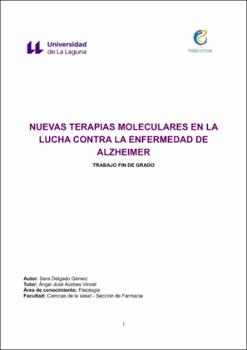Nuevas terapias moleculares en la lucha contra la enfermedad de Alzheimer
Author
Delgado Gómez, SaraDate
2019Abstract
Alzheimer's is a neurodegenerative disease that affects millions of individuals. Despite
involving a diversity of risk factors and being related to the lifestyle, the longevity seems to
be the most relevant one.
Even though it is currently incurable, there exists a symptomatic treatment. Until the last
decade, most studies has focused on anatomopathological markers: the plaques of betaamyloid peptide and the tangles of the Tau protein.
Due to this lack of an effective treatment, the researchers have been attempting to
characterize new Alzheimer's biomarkers. The Final Project has evaluated: 1)the
modifications in the retina microvasculature, which offers a possibility to brain changes,
and 2)the alterations of the light neurofilament protein levels. This protein is not only
released when the neurodegenerative processes are present, but also 16 years before the
symptoms of the disease appear.
In addition, we have also assessment the AMBAR study, as a new treatment against
Alzheimer's. It consists of a plasma replacement for therapeutic albumin in order to
facilitate the elimination of beta-amyloid peptide. Finally, it has been analysed a great
novel scientific approach related to the hippocampal neurogenesis in adults, that is present
up to 90 years and also seems to be reduced in Alzheimer´s pacients.





